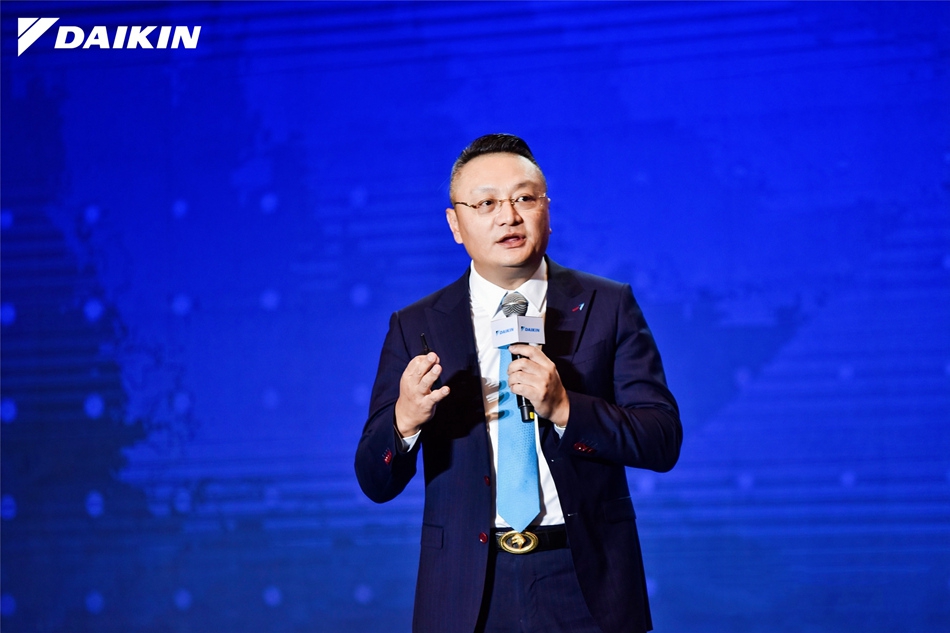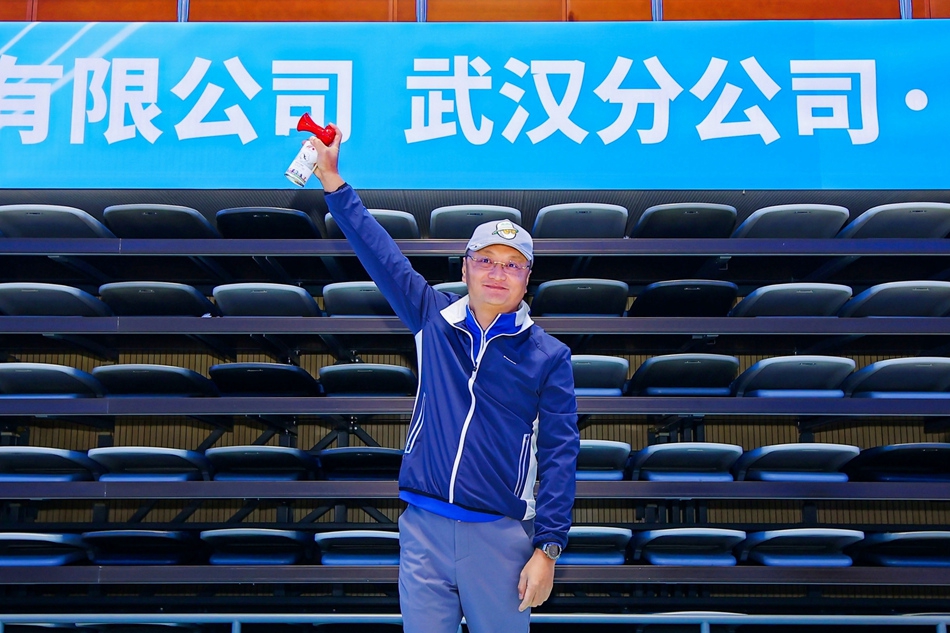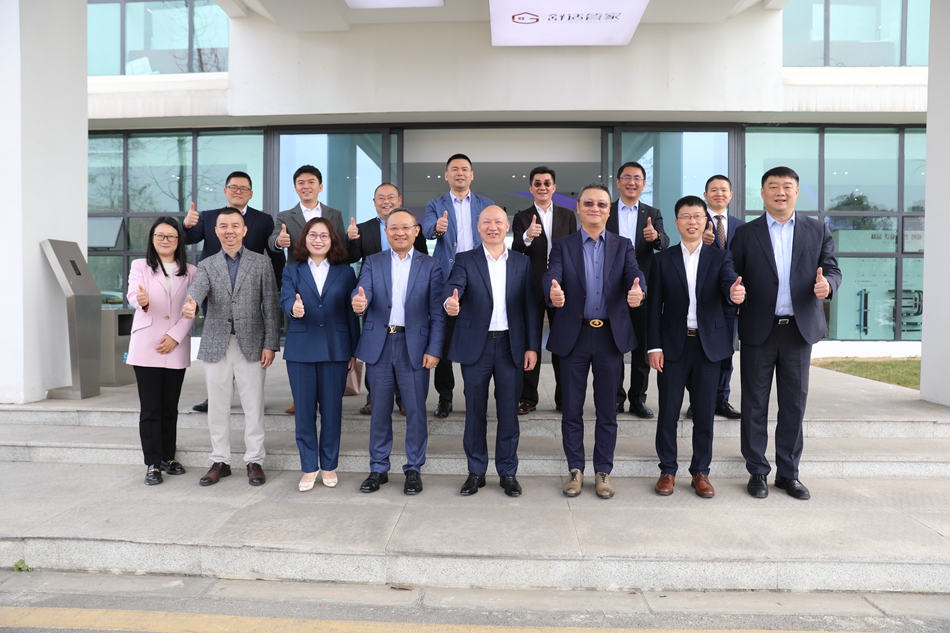- Time:2023-05-24
- Clicks:1882次
In March this year, Mr. Hu Lifeng, Vice President of Daikin (China) Investment Co., Ltd., led a delegation to visit Meijing Group for exchanges. Zhang Huachun, General Manager of Meijing Group, warmly received the delegation.
After a prolonged separation of four years, the two "old friends" finally met face-to-face for the first time. Both of them were filled with excitement and delight, resulting in a two-day sincere communication. The editorial team at Meijing Magazine was granted the privilege of conducting an extensive interview with Daikin and Mr. Hu. The following is the transcript of the interview:

▲ Mr. Hu Lifeng, Vice President of Daikin (China) Investment Co., Ltd.
Q1: Has Mr. Zhang undergone any changes since the last time you two met after many years? Do you have any updated perspectives on Meijing?
A: The only discernible change in Mr. Zhang is the accumulation of wisdom over time. Although we haven't had any contact for the past four years, our mutual understanding remains crystal clear.
With the guidance of Mr. Zhang and Mr. Peng, Meijing has been developing into a more mature and confident company, while the young leadership team's unwavering determination brings constant breakthroughs and innovation to the company. Meijing Comfortable Home's business philosophy and direction are also getting more mature and well-rounded.
Q2: Do you remember the moment when you first got in contact with Meijing? In the past 15 years of cooperation, which aspects of Meijing have left a lasting impression on you?
A: It feels like just yesterday when we first met and became acquainted with each other. When I first met Mr. Zhang 15 years ago, he casually yet resolutely expressed his desire to transition 1,000 of the 3,000 heating clients into those in the air conditioning sector. He made it clear that he really wants to cooperate with Daikin, but if it doesn't come through, he'll keep looking for other brands that meet his high standards.
As we chatted away, we realized that our connection went beyond just business and the dreams and pursuit of our two companies were intertwined.
Similar corporate cultures have finally brought us together, and it has lasted for 15 years. Meijing is the leader in the local place and in the industry, not because of its sales volume, but its value and non-price marketing strategy, as well as its unwavering commitment to innovative thinking. It is not merely a matter of words but the implementation of concrete actions that align with our fundamental principles and the determination to establish and practice our unique enterprise spirit and concepts.
Q3: This year marks the 99th anniversary of Daikin's establishment. As a century-old enterprise, what do you think is the key to Daikin's robust development over the past century?
A: The number "9" symbolizes achievement and longevity in Chinese culture. As a century-old enterprise, Daikin has not only experienced the golden times but also the worst and most challenging times of this century, and it persevered through them. This is what many other enterprises have failed to achieve.
Daikin sticks to a people-oriented approach when doing business, believing that everyone has boundless potential. It blends the growth of its employees with that of the company and always strives for innovation. These efforts have contributed greatly to Daikin's impressive success over the past century.
The number "99" means that Daikin is about to enter a new century in the next year, and all employees and partners are diligently striving to deliver an even brighter future for the company. Their contributions are highly anticipated.

▲ Mr. Hu Lifeng, Vice President of Daikin (China) Investment Co., Ltd.
Q4: Someone says that Daikin has pioneered the "culture of air conditioning". How would you interpret this concept?
A: Creating and maintaining a "culture of air conditioning" is what Daikin has been pushing for and standing by. Among all of Daikin's business concepts, there is one that advocates for "creating new value by anticipating the future needs of customers". That is to say, Daikin will make every effort to explore the internal needs of customers in marketing activities and keep abreast of the changes in social trends, thereby identifying customers' future needs and dreams, even those that the customers themselves may not yet be aware of, and then materializing them. This is our mission and the very core of our existence.
As a manufacturer, we always aim to make things easier and comfier for our customers by providing top-notch, secure products and services. Simultaneously, we endeavor to consistently provide innovative products that astonish and gratify our customers. "Putting the customer first" is a well-known concept in doing business, but being truly customer-first means getting into their shoes and understanding their needs, even those that they themselves may not yet be aware of.
To meet these hidden consumer needs, we need to be perceptive and creative. That is to say, we should have the ability to create demand. Therefore, leading the "culture of air conditioning" is all about constantly discovering and recreating customer demands, and guiding a new development orientation and cultural trend to form a new standard within the industry based on Daikin's insights and technological capabilities.
Q: What user insights or corporate propositions are embedded in Daikin's compelling slogan "Creating New Global Values for Air"?
A: What customers truly need is not simply air conditioning equipment, but a device capable of regulating the indoor air. The optimal approach to satisfying customers' authentic requirements is to cater to their needs for air comfort in different scenarios, including those that may not be consciously perceived by the customers themselves.
For household customers, Daikin offers central air conditioning systems to enhance the aesthetics and comfort of their homes. We address customer pain points from various angles such as temperature, humidity, air distribution, and cleanliness to create a comprehensive home air system that includes air conditioners, floor heating, fresh air ventilation, and AI intelligent connectivity. In the retail sector, Daikin has developed a range of air conditioning solutions tailored to different usage scenarios and expanded our offerings from basic equipment services to comprehensive life cycle solutions for customers.
Therefore, we say that Daikin uses air to come up with solutions that truly meet customers' needs, including comfortable, energy-efficient and eco-friendly options, healthy air solutions, value-added services and more.
Q5: Considering your 19-year tenure at Daikin and extensive knowledge of the home appliance and pan-household appliance industries, what transformations do you think have occured in the overall sector in recent years? Are there any areas we need to pay special attention to?
A: I had the honor of texting with my acquaintances at Meijing through Meijing Magazine before. I recall that we referenced the term "new normal" in our discourse, alluding to the post-pandemic reality we were experiencing. However, after three years of the pandemic, we have observed significant changes in the time trends, market landscape and customer behavior. We realized that going back to how things were before the pandemic might not be doable or even desirable.
The industry changes brought about by the "new normal" and the pandemic have resulted in some qualitative transformations across the industry. This represents a new way of thinking and change brought about by the dual-carbon economy, a more complex political and economic environment, the era of the Internet of Things, and the age of AI intelligence.
Q6: The year 2023 marks a new beginning after three years of pandemic spread. Will Daikin and Meijing embark on new explorations in the subsequent collaboration? What's your take on it?
A: We have discussed the new direction of our collaborative exploration and cooperation, and established short-term objectives. As long as we stick to the fundamental principle of cooperation and avoid crossing boundaries, we can promote inclusivity and mutual understanding. Moreover, by pursuing growth on both sides and striving for win-win outcomes, we can contribute to each other's continuous development.
Q7: Last year, Meijing Magazine invited you to write an article centered around the theme of "A Letter to Meijing". Within this piece, a profound statement was made: "Doing challenging but right things". Would it be accurate to say that this is your fundamental personal value creed?
A: No, I don't think so. My way of living is all about being flexible and finding happiness in the simple things. I try to keep things easy for myself and those around me, avoiding causing trouble for myself and others. However, it is simply unfeasible for enterprises to operate in such a manner since the market operates under the law of natural selection, only those who can adapt to and evolve with the changes are able to survive.
I always remind my colleagues that Daikin doesn't simply follow the market, but rather creates new markets with our own hands until they gradually become ours. So, in the past when Daikin was growing rapidly, we often did things that our competitors wouldn't or couldn't do, which helped us achieve even more growth.
We have employed a range of strategies to impress our customers, including persistent marketing efforts, on-site presence to engage with customers, fostering an air conditioning culture, and providing customized proposals for customers. These tasks are both time-consuming and labor-intensive, requiring significantly more effort than simply lowering prices or increasing advertising efforts.
Sometimes it may seem quicker or easier to tackle simple tasks, but sales ultimately rely on interpersonal communication and some obstacles are inevitable. Similar to ascending a staircase, the process can be exhausting, but each step we take represents a crucial building block towards ultimately solving the problem at hand. If we take the easier path instead of climbing stairs, we might make quick progress at first. But the problems that need to be solved will eventually become a roadblock that hinders our way forward.
Q: This sentence may be interpreted as "Choosing challenging and long-term endeavors instead of focusing on short-term gains and waiting for market dividends", right? However, in the current business landscape, enterprises face a dual challenge. On the one hand, they must uphold the fundamental principle of producing high-quality products, which requires time. On the other hand, in a volatile market environment, especially with the emergence of new marketing carriers like live streaming and new media that highlights rapid transformation and monetization, how can they remain steadfast in their commitment? How can enterprises find a balance between long-term orientation and short-term benefits?
Indeed, it is quite challenging to achieve a balance between two competing factors. As the saying goes, "Adults do not always have clear-cut choices". But how we approach the balance between long-term orientation and short-term gains or weigh the importance of quantity versus quality is a complex issue that requires careful consideration.
Our top priority is to ensure that our actions are in line with the development trend of the times. In the pursuit of benefits, we will find that short-term benefits are more focused on the pursuit of quantity. Long-term orientation means viewing the growth of "quantity" from the perspective of "quality".
"Quantity" plays an undeniably crucial role in the operation of enterprises, from the organization as a whole down to each individual sales team and representative. However, if we focus solely on "quantity", we may become too fixated on short-term goals and trapped in the excessive pursuit of "methods" and "approaches". This could cause us to overlook important factors such as healthiness, stability, and sustainability for long-term market growth.
If we thoroughly examine this matter, it will become apparent that only through the accumulation of quantitative changes can we ensure health and stable, sustainable qualitative growth. These two concepts are not mutually exclusive. This is my view on "quantity" and "quality", "long-term orientation" and "short-term benefits".
Taking live streaming and new media as examples, they are actually new means of communication and marketing that have emerged from the development and changes in technology, times, and user behaviors. These methods have broken the spatiotemporal constraints, making it more convenient for us to connect with customers accurately while providing abundant and transparent information. Especially in the era of COVID-19, there has been a significant acceleration in the development of online communication tools. For certain industries, live-streaming and online platforms have become crucial sales channels and even a lifeline on which enterprises rely. In this regard, I think Daikin should actively adopt new approaches, embrace changes, continue to analyze customer characteristics, and firmly follow the B2C path.
However, it is crucial to distinguish between superficial phenomena and their inherent nature. At Daikin, our ultimate goal is to obtain the recognition of our customers by delivering proposals, services, and solutions that surpass their expectations. If Daikin believes that relying solely on online channels can swiftly resolve the issue of customer acquisition and transactions, it may lose its unique appeal to customers and fail to widen the gap with competitors in this fast-paced mode, thereby losing customer recognition.
Meanwhile, online traffic is inherently limited, which means that customer acquisition costs will inevitably increase until they reach a point of balance. In a nutshell, it is essential to embrace new approaches and changes while preserving the core strengths and values that we live by. The best approach is to create a cohesive marketing strategy that combines online and offline methods, utilizing their strengths in a mutually reinforcing way while staying true to Daikin's unique brand identity.
Regarding long-term orientation and short-term benefits, I think it is important for enterprises such as Daikin and Meijing to adhere to fundamental principles that encompass the legality and compliance of enterprise operations, fairness and integrity in partnerships, unwavering commitment to providing high-quality products and services to customers, as well as resolute protection of customers' rights and interests. These principles not only form the foundation of enterprise operations but also serve as its vital lifeline.
Q8: Lastly, could you provide any constructive suggestions for the further development and growth of Meijing?
A: After overcoming the challenges and obstacles brought by the pandemic over the past three years, I have witnessed Meijing's resilience and its strong vitality. This is inseparable from the enterprise management philosophy of Mr. Zhang and the Meijing cadre team, as well as the culture jointly created and upheld by the Meijing team.
Now we're living in a time like no other, where what we knew before can't fully explain the challenges we face and our past experiences can't completely solve present problems. Therefore, I'm really looking forward to Meijing and Daikin's continued collaboration towards a shared mission and vision.
▲ Group photo of the managements of Daikin & Meijing in Chengdu in March 2023
- Wang Tie, Chairman of GWT: Service Leads Upgrade of Health Consumption 2023-06-02
- Mr. Mineo Maruyama, President of Carrier GCS China, Leads a Delegation to Visit Meijing Group for Ex 2023-06-02
- Mr. Xie Xintian, China Zone President of BDR THERMEA GROUP, Leads Visiting Group to Meijing for a St 2023-05-24
- Finding Solutions and Creating Values 2023-05-24
- 2023 Ariston (Guizhou) Dealers Summit Kicks Off 2023-05-24
- President Zheng Zhaomin of Ariston (China) and Her Delegation Visit Meijing Group for Exchanges 2023-05-19
- Wang Tie, Chairman of GWT: Service Leads Upgrade of Health Consumption 2023-06-02
- Mr. Mineo Maruyama, President of Carrier GCS China, Leads a Delegation to Visit Meijing Group for Ex 2023-06-02
- Mr. Xie Xintian, China Zone President of BDR THERMEA GROUP, Leads Visiting Group to Meijing for a St 2023-05-24
- Finding Solutions and Creating Values 2023-05-24
- 2023 Ariston (Guizhou) Dealers Summit Kicks Off 2023-05-24
- President Zheng Zhaomin of Ariston (China) and Her Delegation Visit Meijing Group for Exchanges 2023-05-19



